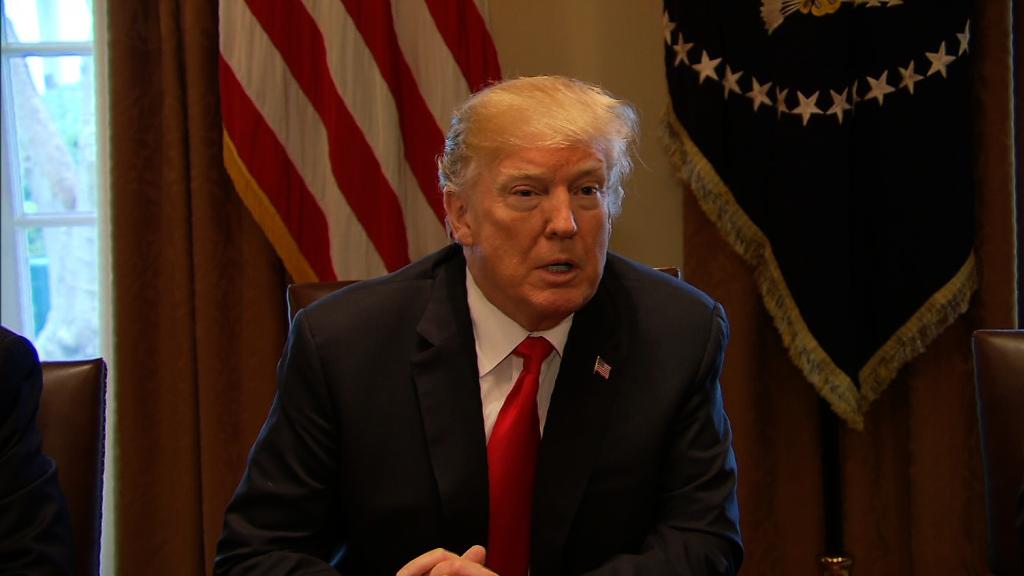
Backlash to President Trump's announcement of steep tariffs on steel and aluminum was swift and angry from some of the United States' most important trading partners — and top US allies are pledging to retaliate, if necessary.
Trump said Thursday that his administration will impose a 25% tariff on steel imports and a 10% tariff on aluminum imports as early as next week, in order to boost domestic manufacturers.
It's not yet clear whether some key US trading partners will be exempt — which means even the European Union and Canada, the largest supplier of steel to the US, could get hit with the new duties.
The EU and Canada both expressed their opposition to the new tariffs shortly after they were announced, and said they weren't afraid to retaliate.
"We will not sit idly while our industry is hit with unfair measures that put thousands of European jobs at risk," European Commission President Jean-Claude Juncker said in a statement.
Related: Dow drops more than 400 points after Trump announces tariffs
Juncker said the EU will "react firmly and commensurately," and will develop a plan to retaliate, per World Trade Organization rules, "in the next few days." Steel industry groups in Europe came out in support of that move on Thursday.
"The EU must respond decisively to US punitive tariffs, which endanger thousands of jobs in Europe," said German Foreign Minister Sigmar Gabriel. "There should be no doubt about that in Washington."
The British government said in a statement that it was "particularly concerned" about new trade barriers, and said countries must work together to solve problems of overcapacity.
Canada, meanwhile, said that any trade restrictions on Canadian steel and aluminum would be "absolutely unacceptable."
"Should restrictions be imposed on Canadian steel and aluminum products, Canada will take responsive measures to defend its trade interests and workers," Canadian Foreign Minister Chrystia Freeland said in a statement.
Related: Trump's new tariffs could make beer, cars and baseball bats more expensive
US trading partners are worried first and foremost about how the sizable taxes will affect demand for their steel and aluminum exports.
"This announcement is disappointing," Australian Trade Minister Steven Ciobo told reporters on Friday. "An imposition of a tariff like this will do nothing other than distort trade, and ultimately ... will lead to a loss of jobs."
Australia's share of the U.S. steel and aluminum markets is worth around $550 million in total, Ciobo said. He said Australia is pushing for the Trump administration to exempt it from the new tariffs.
South Korea, a key US ally that shipped 3.6 million tons of steel products to the US in 2017, said it would continue to talk to the Trump administration in hopes of minimizing damage to its economy.
Affected countries aren't likely to take a big economic hit lying down.
"This is the opening salvo in a trade war. The countries we deal with are not going to sit there and take this," said Phil Levy, senior fellow at the Chicago Council on Global Affairs, and a former White House economist under former President George W. Bush.
Related: NY Fed chief says tariffs risk 'trade war' as Trump eyes protectionist action
Countries are also taking issue with the method the US is using for the trade measures.
Trump will implement the tariffs under Section 232 of the Trade Expansion Act, a little-known trade law from 1962. To do that, Trump must claim that steel and aluminum imports hurt the country's national security.
Critics say that justification is a stretch, and makes a mockery of international trade rules.
"It is entirely inappropriate to view any trade with Canada as a national security threat to the United States," Freeland said in Canada's statement.
International trade experts believe that the policy mechanism behind the president's decision will make it easier for other countries to enact tit-for-tat tariffs in the name of national security.
"It opens up a Pandora's box for how trading partners might respond," said Chad Bown, senior fellow at the Peterson Institute for International Economics.
He added: "Retaliation would harm American companies, farmers, and workers that export and who — as innocent bystanders — have nothing to do with steel or aluminum."
It's not yet clear which US industries would be at risk. American agricultural exports, like soybeans, are thought to be particularly exposed.
Related: Trump tariffs on steel will hit China -- and the entire global trading system
China has not yet weighed in on the tariffs, but expressed its strong opposition when the Commerce Department released its proposals last month.
At the time, the Chinese Commerce Ministry voiced "strong dissatisfaction" with the proposed tariffs, and said they would "[aggravate] the global trade environment."
The US imports the most steel — 16% — from Canada. It imports 13% from Brazil, 10% from South Korea, 9% from Mexico and 9% from Russia, according to a Department of Commerce report from December 2017. China clocks in at number 11.
In terms of value, Canada, South Korea and Mexico are the top three exporters to the US.
The top five countries from which the United States imported aluminum in 2017 were Canada, China, Russia, the United Arab Emirates and Bahrain, according to Panjiva, a global trade research firm recently acquired by S&P Global.
-- Qiaoqiao Yu contributed to this report.


